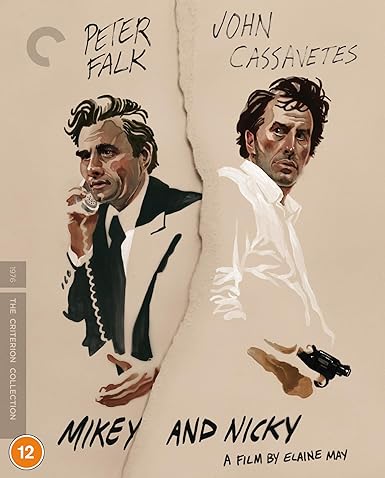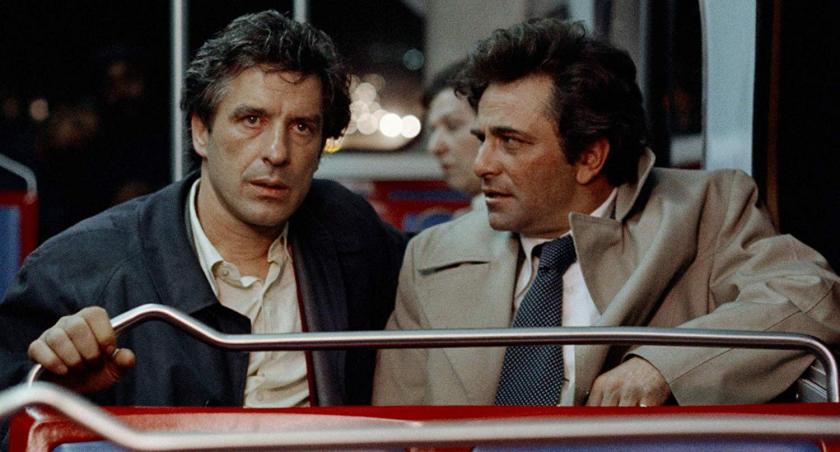The blurb that accompanies this Criterion Blu-ray calls Elaine May’s Mikey and Nicky, which co-stars John Cassavetes and Peter Falk as scuzzy, low-ranking gangsters on the run from their bosses, “an unsung masterpiece of American cinema”. For once, that doesn’t feel like hyperbole.
The film opens with Nicky (Cassavetes) holed up in a flophouse hotel, itching with paranoia and convinced his mob bosses have a hit out on him. He calls his fellow gangster and lifelong best friend Mikey (Falk), but then refuses to open the hotel room door and let him in. It’s a metaphor for the whole story, the swings and roundabouts of male friendship, the fuzzy line between loyalty and betrayal.
The pair spend a long dark Philadelphia night negotiating the city’s underbelly while feeling each other out for clues to what’s really going on. May’s camera captures a world in which interiors are sweaty, dilapidated, and pulsing with menace, while the exteriors are even more nightmarish – a world of sickly greens and blues, bloody reds, migraine neons. The movie looks like it was designed by Edward Hopper on ketamine.
If Mikey and Nicky are hiding from the mob, they’ve a funny way of showing it. Everywhere they go they're loud, disruptive, and often violent. Money is always a negative presence in this film, and the milieu these characters inhabit suggests that crime doesn’t pay nearly enough. They stumble through dive bars that make the taverns in Martin Scorsese’s Mean Streets seem like the Algonquin. Nicky has qualities in common with Robert De Niro’s Johnny Boy in the Scorsese film – he’s nervy, hyper, capricious, a bullshitter, a loose cannon, a liability – but without the charm or the hints of vulnerability.
 As the night wears on, the pair indulge in existential colloquies, like Beavis and Butt-Head doing Waiting for Godot. Mikey initially seems the saner of the two, more decent. But they're both misogynists, cruel, crude, abusive, violent, misanthropic, self-pitying, greedy, and fickle.
As the night wears on, the pair indulge in existential colloquies, like Beavis and Butt-Head doing Waiting for Godot. Mikey initially seems the saner of the two, more decent. But they're both misogynists, cruel, crude, abusive, violent, misanthropic, self-pitying, greedy, and fickle.
Midway through – as if to say “Think these two guys are unsympathetic on their own? Wait till you see them try interacting with women” – May throws in a scene that can best be described as a dystopian psychosexual interlude.
Estranged from his wife, Nicky visits his mistress, Nellie (Carol Grace), with Mikey in tow. Mikey perches serenely on a bin in the kitchen while Nicky forces himself upon Nellie in the living room, before encouraging Mikey to take a crack at her, too. Mikey’s willingness to do so, and his rage when she rejects him, eradicates any residual sense we might have had that he was in any significant way less of a douchebag than Nicky.
So it’s not a feelgood movie, or a comedy per se. But there’s an undercurrent of gallows humour, and May treats the pair with generous empathy. There are tender moments between them, and in the quieter scenes, we can feel the potency of camaraderie, the rarity value of having a true friend on whom you can always rely (until you can’t). Mikey and Nicky are a couple of shits, but we do give a shit about them.
The acting is outstanding: real, raw, complex. Falk and Cassavetes are as impressive as each other. A lot of the dialogue feels so natural you’d think it was improvised, yet it isn’t. Oh, and there’s no mumbling. Contemporary filmmakers take note: intelligible dialogue isn’t just for Jane Austen adaptations.
Carol Grace is riveting as Nellie, sucking all the air out of the room in that awful coercive sort-of sex scene. Joyce Van Patten has a gravitas as Jan, Nicky's wife, that reminds me of Beatrice Straight in Network. As Annie, Mikey's wife, Rose Arrick doesn't have as meaty a role as Van Patten, but she brings to it a calm, almost dissociative sensibility that’s consonant with the ambiguities of the character and her relationship with Mikey.
The Criterion disc isn’t exactly overloaded with extras. There’s no commentary track, just a couple of mini documentaries, a trailer and promo, and an old audio interview with Falk. We learn that May knew some characters like these "connected guys" growing up, which may be why they ring so true. They’re gangsters who come across like our best guess at what gangsters actually are: seedy, grasping men scratching around in search of any kind of angle they can temporarily grab hold of. They are not glamorised like Marlon Brando's Don Vito Corleone in The Godfather, let alone like the cartoon hoods of Pulp Fiction. Mikey and Nicky is a genuine hidden gem of 1970s cinema.















Add comment